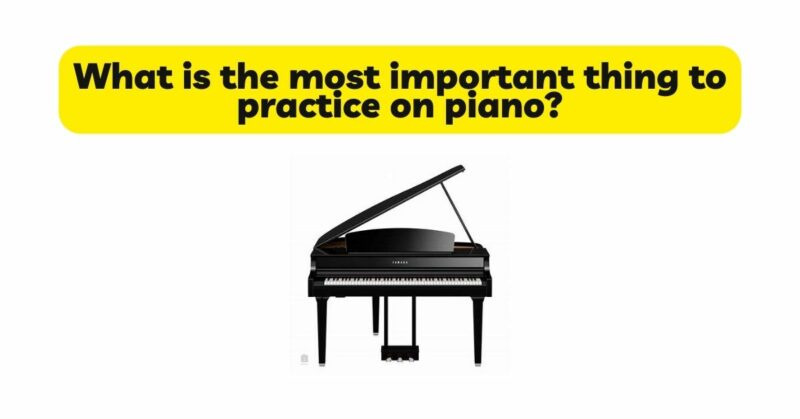Practicing the piano is an essential part of improving your skills and musicality. However, with limited practice time, it’s crucial to identify the most important areas to focus on for optimal progress. In this article, we will explore the key elements that are considered the most important to practice on the piano. By prioritizing these areas, you will maximize your practice sessions and lay a strong foundation for growth as a pianist.
- Technique: Technique forms the backbone of piano playing and encompasses various physical skills required to produce sound effectively and efficiently. Devote a significant portion of your practice time to developing solid technique. This includes finger exercises, scales, arpeggios, and other technical drills. Pay attention to aspects such as hand position, finger independence, control, and fluidity of motion. By practicing technique regularly, you will enhance your overall proficiency on the piano.
- Sight-Reading: Sight-reading is the ability to play music on sight without prior preparation. It is a valuable skill that allows you to learn new pieces quickly and efficiently. Dedicate time to sight-reading practice by working through a variety of musical pieces at your skill level. Focus on reading the notes accurately, maintaining a steady tempo, and playing with musicality. Regular sight-reading practice will improve your reading fluency and expand your repertoire.
- Rhythm and Timing: Developing a strong sense of rhythm and precise timing is crucial for musical expression. Practice rhythmic exercises, clapping rhythms, and playing along with a metronome. Pay attention to different note durations, rests, and the relationships between various rhythmic patterns. Aim for accuracy, consistency, and the ability to maintain a steady tempo. By honing your rhythmic skills, you will enhance your overall musicality and ability to play with others.
- Ear Training: Ear training is the process of developing your musical ear and the ability to recognize and reproduce pitches, intervals, and chords. Practice activities such as identifying intervals, playing back melodies by ear, and transcribing simple songs. Additionally, listen attentively to a variety of music genres to develop a sense of tonality, dynamics, and phrasing. Developing strong ear training skills will improve your ability to play by ear, harmonize melodies, and communicate expressively through your playing.
- Repertoire: Building a diverse and well-rounded repertoire is essential for your musical growth. Dedicate time to learning and mastering pieces from various musical periods and genres. Select pieces that challenge your technical abilities and stretch your musicality. Focus on interpreting the music, conveying emotions, and paying attention to details such as dynamics, phrasing, and articulation. By continually expanding your repertoire, you will broaden your musical knowledge and develop a deeper understanding of different styles.
- Musical Interpretation: Interpreting music is an art form that goes beyond playing the right notes. Spend time exploring different interpretations of the pieces you are learning. Experiment with dynamics, articulation, and expressive elements to convey the composer’s intentions. Analyze the structure of the music, identify melodic and harmonic highlights, and make thoughtful musical decisions. Developing your interpretation skills will add depth and personality to your performances.
- Practice Strategies: Effectively utilizing your practice time is just as important as the activities themselves. Develop effective practice strategies, such as breaking down challenging sections into smaller parts, repeating difficult passages, and practicing at slower tempos before gradually increasing the speed. Use a metronome to ensure rhythmic accuracy and a consistent tempo. Implement focused and deliberate practice sessions that target specific goals and areas for improvement. By practicing strategically, you will optimize your progress and achieve better results in less time.
- Performance Skills: Playing the piano is not just about practicing in solitude but also about sharing your music with others. Regularly perform for family, friends, or in public settings such as recitals or open mic nights. Performing in front of an audience helps develop confidence, stage presence, and the ability to handle nerves. Embrace performance opportunities as a chance to showcase your hard work and connect with others through music.
- Reflective Practice: In addition to focused practice sessions, take time for reflective practice. Analyze your performances, recordings, and practice sessions critically. Identify areas that need improvement and develop strategies to address them. Celebrate your achievements and set realistic goals for future progress. Reflective practice helps you gain self-awareness, identify strengths and weaknesses, and make necessary adjustments to your practice routine.
Conclusion: While every aspect of piano playing is important, certain areas deserve more attention during practice sessions. By prioritizing technique, sight-reading, rhythm and timing, ear training, repertoire, musical interpretation, practice strategies, performance skills, and reflective practice, you will lay a strong foundation for growth as a pianist. Remember to strike a balance between these areas and tailor your practice sessions to your individual needs and goals. With consistent and focused practice, you will experience significant progress and enjoy a fulfilling musical journey at the piano.


